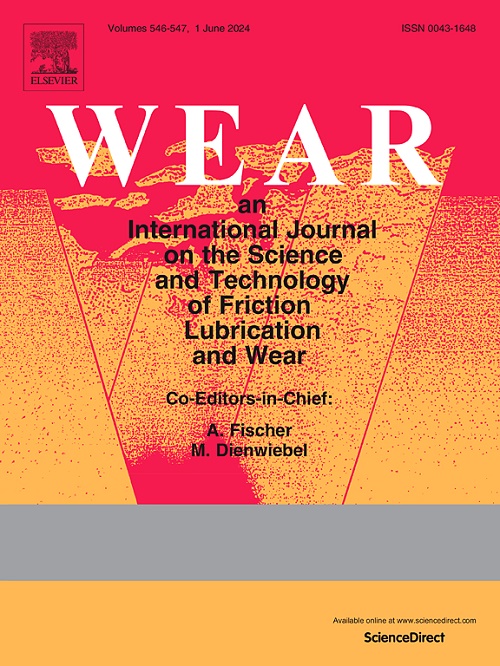Laser cladding Ni60-SiC/Ti3SiC2 self-lubricating composite coatings on IN718 alloy: Wear mechanisms and oxidation behaviors
IF 5.3
1区 工程技术
Q1 ENGINEERING, MECHANICAL
引用次数: 0
Abstract
To enhance the service performance of IN718 alloy under severe working conditions, the self-lubricating composite coating of Ni60-SiC/Ti3SiC2 was fabricated on its surface using laser cladding. By systematically analyzing the microstructure and properties of composite coatings, the wear mechanism at different temperatures and the oxidation behavior at 800 °C of coatings were discussed in depth. The results demonstrate that an increase in coatings’ microhardness by a factor of 1.9–3.1 over IN718 was achieved, benefiting from the fine-grained and solid-solution strengthening actions, and the hard phases such as C23C6, Ni3Si, TiC distributed diffusely inside the coatings. The tribological performance of coatings was also significantly improved, in which the coating with 10 wt% Ti3SiC2 added had the lowest wear rates of 2.13 and 3.57 × 10−5 mm3/N·m at RT and 600 °C, respectively, which were reduced by 82.74 % and 87.43 % compared to the substrate. When the test temperature changes from RT to 600 °C, the main wear form of coatings changes from adhesive and abrasive wear to oxidative wear. With the Ti3SiC2 content increasing, the oxide film is gradually dense and uniform, and the oxidation resistance is significantly improved.
在 IN718 合金上激光熔覆 Ni60-SiC/Ti3SiC2 自润滑复合涂层:磨损机理和氧化行为
为了提高 IN718 合金在恶劣工作条件下的使用性能,采用激光熔覆技术在其表面制造了 Ni60-SiC/Ti3SiC2 自润滑复合涂层。通过系统分析复合涂层的微观结构和性能,深入探讨了涂层在不同温度下的磨损机理和 800 °C 时的氧化行为。结果表明,与 IN718 相比,涂层的显微硬度提高了 1.9-3.1 倍,这得益于细粒度和固溶强化作用,以及涂层内部弥散分布的 C23C6、Ni3Si、TiC 等硬质相。涂层的摩擦学性能也得到了显著改善,其中添加了 10 wt% Ti3SiC2 的涂层在 RT 和 600 °C 下的磨损率最低,分别为 2.13 和 3.57 × 10-5 mm3/N-m,与基体相比分别降低了 82.74 % 和 87.43 %。当测试温度从 RT 变为 600 °C 时,涂层的主要磨损形式从粘着磨损和磨料磨损变为氧化磨损。随着 Ti3SiC2 含量的增加,氧化膜逐渐致密均匀,抗氧化性显著提高。
本文章由计算机程序翻译,如有差异,请以英文原文为准。
求助全文
约1分钟内获得全文
求助全文
来源期刊

Wear
工程技术-材料科学:综合
CiteScore
8.80
自引率
8.00%
发文量
280
审稿时长
47 days
期刊介绍:
Wear journal is dedicated to the advancement of basic and applied knowledge concerning the nature of wear of materials. Broadly, topics of interest range from development of fundamental understanding of the mechanisms of wear to innovative solutions to practical engineering problems. Authors of experimental studies are expected to comment on the repeatability of the data, and whenever possible, conduct multiple measurements under similar testing conditions. Further, Wear embraces the highest standards of professional ethics, and the detection of matching content, either in written or graphical form, from other publications by the current authors or by others, may result in rejection.
 求助内容:
求助内容: 应助结果提醒方式:
应助结果提醒方式:


